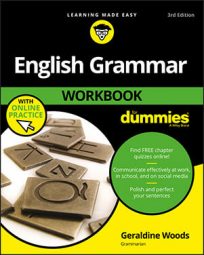- After an action verb, you may find a word — or several words — answering the question whom? or what? begun by the verb. That’s the direct object. For example, in the sentence Lulu hates sports, hates is the action verb and Lulu is the subject of hates. Ask Lulu hates whom? and you get no answer. Ask Lulu hates what? and the answer is sports. Sports is the direct object of the verb hates.
- Action verbs also occasionally appear with a direct object and an indirect object. In the sentence Lulu gave me an annoyed glance, the subject-verb combination is Lulu gave. The direct object of the verb gave is glance, which answers the question Lulu gave what? The indirect object questions are to whom? to what? So now you have Lulu gave an annoyed glance to whom? The answer is to me, and me is the indirect object. (You don’t get an answer when you ask to what.)
- After a linking verb, simply ask who? or what? to find the subject complement. In the sentence Lulu is a terrible basketball player, the subject-verb combo is Lulu is. Now ask Lulu is who? Lulu is what? The answer is a terrible basketball player. The most important word in that answer is player, and player is the subject complement.
Most of the time the distinction between objects and complements doesn’t matter. When a pronoun completes the thought begun by the subject and verb, however, you have to be alert. In formal English, the same type of pronoun that acts as a subject also acts as a subject complement. Subject pronouns and object pronouns don’t always match.
Practice questions
Locate the objects and subject complements in each sentence. Underline each one and label it as a direct object (DO), an indirect object (IO), or a subject complement (SC).- The applause always sounds louder when Lola plays.
- Who would challenge him?
Answers to practice questions
- louder (SC). Sounds is a linking verb, connecting the subject applause with louder, the subject complement.
- him (DO). The verb is would challenge and the subject is who. When you ask who would challenge whom or what? the answer is him, a direct object.

